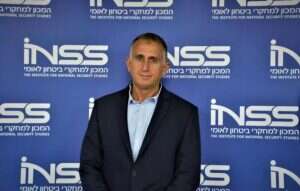Having the West sign a nuclear deal with Iran at this time could serve Israel's interests, former Military Intelligence Director Maj. Gen. (Res.) Tamir Hayman argues in an interview with Israel Hayom.
Follow Israel Hayom on Facebook, Twitter, and Instagram
Recently named managing director of the Institute for National Security Studies, Hayman's position stands in stark contrast to that of the government, but he says it is based on the ever-evolving data on the issue.

"At any point in time, things should be examined according to the data available. So what does Iran have at the moment? According to Defense Minister Benny Gantz, Iran already has more than 50 kilograms of uranium enriched to 60%, when one bomb requires 42 kg, meaning that they have exceeded the amount of fissile material sufficient to produce the first bomb.
"This means that the situation that would have happened once the nuclear deal elapsed [in 2030] wouldn't have been as bad as the current situation, as Iran has stockpiled so much enriched material and its abilities have advanced beyond what the deal had allowed it to pursue.
"Therefore, my conclusion is that in the reality of here and now, reaching a deal is the right thing," he explained.
An agreement between Wester powers with the Islamic republic will buy Israel time, Hayman said. "It would diminish the offset the amount of enriched uranium Iran has; it would set it back and it would buy [us] a very long time because enrichment takes a long time."
Israel could put this time to good use, he continued. "It can be used to issue threats, improve military capabilities, form international coalitions, or put in place infrastructure for the day after the current deal elapses."
Hayman's position on the Iranian issue goes against the stated position of the defense establishment and the government. Prime Minister Naftali Bennett, Foreign Minister Yair Lapid, and Gantz, as well as the professional echelon advising them, all vehemently oppose Washington's plan to rejoin the 2015 nuclear deal, which then-President Donald Trump exited in 2018.
Touching on his new role at the INSS, Hayman also spoke about his meetings with Russian President Vladimir Putin, during which he presented the need for Israeli action against Iranian targets in Syria, and his emotional reaction during the ceremony which saw the remains of Israeli soldier Zachary Baumel return home some 37 years after he went missing during a major battle fought in 1982 on the Syrian-Lebanon border.
The former MI chief rejected the claim that the retrieval of Baumel's remains was an election campaign "gift" from Putin to Netanyahu, saying, "That's simply not true. This was a long operation the efforts of which had come to fruition. There were past attempts to make it happen. The timing had nothing to do with the elections."
Hayman further said he believes Israel should take a stronger stand against the Russian invasion of Ukraine.
"Israel can have a much clearer voice on this matter. The State of Israel strongly opposes any interference by a foreign power in border conflicts and national issues of self-determination, so it is in Israel's interest to come out and say that we oppose anyone who thinks of solving border problems through military force, military enforcement, and sans and internal solution."
Asked whether such Israeli criticism would affect the Israeli Air Force's operation leeway in Syria, where Russia has held a military presence since late 2015 as part of its efforts to shore up the presidency of ally Bashar Assad, Hayman said that even if things came to that, Israel could handle it.
"These are tactical considerations and they shouldn't impact making such an important stand with respect to morals and national security."
Subscribe to Israel Hayom's daily newsletter and never miss our top stories!




